Dod source selection procedures 2022 – The Department of Defense (DoD) Source Selection Procedures 2022 represent a significant update to the established procurement process, introducing transformative changes that aim to enhance efficiency, transparency, and fairness. This comprehensive guide delves into the intricacies of these procedures, providing a roadmap for successful implementation and maximizing outcomes.
This in-depth analysis will illuminate the key principles, objectives, and step-by-step process Artikeld in the DoD Source Selection Procedures 2022. By examining best practices, case studies, and emerging trends, this guide empowers stakeholders with the knowledge and strategies necessary to navigate the evolving landscape of source selection.
Definition and Overview of DoD Source Selection Procedures 2022
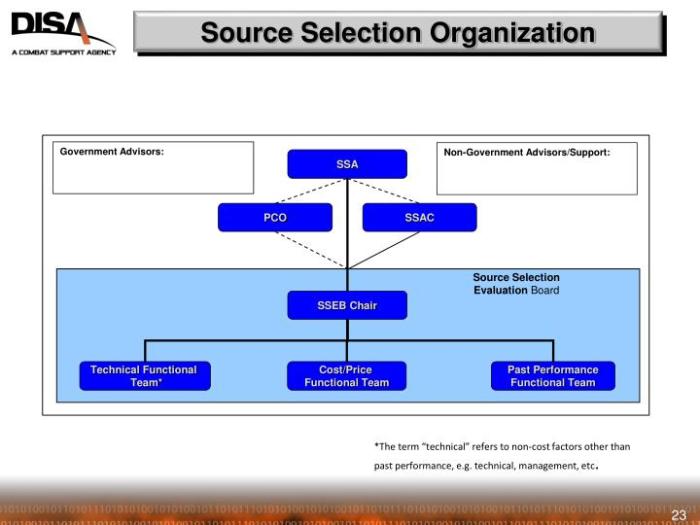
The Department of Defense (DoD) Source Selection Procedures 2022 are a comprehensive set of guidelines that govern the process of selecting contractors for government contracts. These procedures are designed to ensure that the DoD acquires goods and services in a fair, impartial, and competitive manner.
The key principles of the DoD Source Selection Procedures 2022 include:
- Fairness:All contractors must be given an equal opportunity to compete for government contracts.
- Impartiality:The source selection process must be free from bias or favoritism.
- Competition:The DoD must seek to obtain the best possible value for its procurements by encouraging competition among contractors.
The DoD Source Selection Procedures 2022 have evolved over time to reflect changes in the government contracting landscape. The current procedures are based on the Federal Acquisition Regulation (FAR) and the DoD FAR Supplement (DFARS).
Key Changes and Updates in DoD Source Selection Procedures 2022
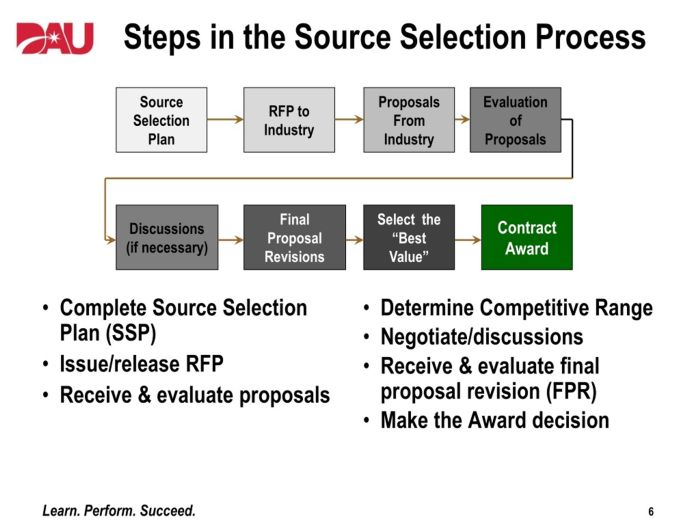
The Department of Defense (DoD) has implemented significant changes and updates to its Source Selection Procedures in 2022. These revisions aim to enhance the efficiency, transparency, and fairness of the source selection process.The rationale behind these changes is to streamline the process, reduce administrative burden, and align with best practices in the industry.
The updates also reflect the evolving nature of acquisition and the increasing use of technology in the procurement process.
Streamlining the Evaluation Process
One major change is the introduction of a new streamlined evaluation process. This process reduces the number of evaluation factors and focuses on those that are most relevant to the acquisition. The goal is to simplify the evaluation process and make it more efficient.
Enhanced Transparency
Another key update is the increased transparency in the source selection process. The DoD has implemented new requirements for providing feedback to offerors and for documenting the evaluation process. This increased transparency is intended to improve communication and build trust between the government and offerors.
Leveraging Technology
The 2022 Source Selection Procedures also encourage the use of technology to improve the efficiency and effectiveness of the process. The DoD has developed new tools and resources to support the use of technology in source selection, including electronic submission of proposals and electronic evaluation tools.
Impact on Stakeholders
These changes have a significant impact on the roles and responsibilities of stakeholders in the source selection process. Offerors must now be more strategic in their proposal preparation and must focus on the most relevant evaluation factors. Source selection authorities must be more transparent in their evaluation process and must provide timely feedback to offerors.
Step-by-Step Guide to DoD Source Selection Procedures 2022
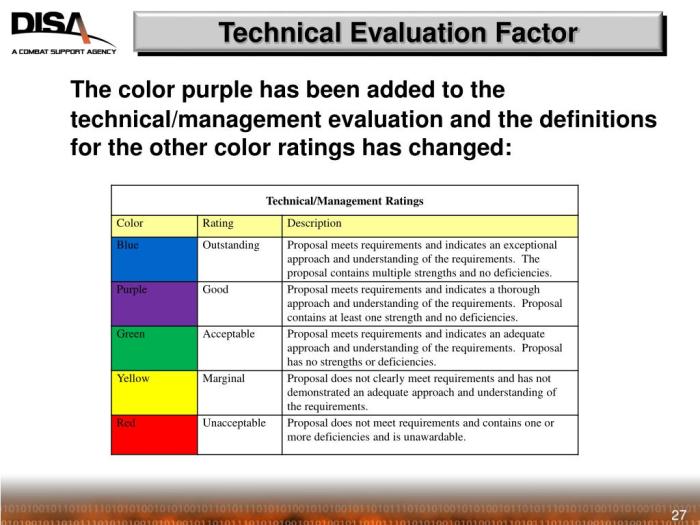
DoD source selection procedures for fiscal year 2022 involve a series of key steps that contracting officers must follow to ensure fair and transparent procurement processes. These steps include planning, solicitation, evaluation, and award.
The following flowchart provides a visual representation of the DoD source selection process flow:

Step 1: Planning
The planning phase involves defining the acquisition requirements, developing the solicitation, and establishing the evaluation criteria. The contracting officer must clearly articulate the government’s needs and objectives to potential offerors.
Step 2: Solicitation
The solicitation is the formal document that invites potential offerors to submit proposals. It includes detailed instructions on how to prepare and submit proposals, as well as the evaluation criteria that will be used to assess them.
Step 3: Evaluation
The evaluation phase involves reviewing and assessing the proposals submitted by offerors. The contracting officer and evaluation team evaluate proposals based on the established evaluation criteria and determine which proposal represents the best value to the government.
Step 4: Award
The award phase involves selecting the successful offeror and awarding the contract. The contracting officer must ensure that the selected offeror meets all the requirements of the solicitation and is capable of performing the contract successfully.
Best Practices for Implementing DoD Source Selection Procedures 2022

Effectively implementing the DoD Source Selection Procedures 2022 requires adherence to best practices that ensure transparency, fairness, and efficiency throughout the process. These best practices include:
Establishing a Clear and Comprehensive Source Selection Plan
Develop a detailed source selection plan that Artikels the evaluation criteria, selection methodology, and timelines. This plan should be shared with all potential offerors to ensure a level playing field.
Maintaining Transparency and Communication
Communicate regularly with potential offerors throughout the process. Provide timely updates, answer questions, and address concerns to foster trust and confidence.
Objectively Evaluating Proposals
Establish an evaluation team with the necessary expertise and objectivity to assess proposals. Use clear and consistent criteria to ensure fair and impartial evaluations.
Managing Risks and Challenges
Identify potential risks and challenges early on and develop mitigation strategies. Establish a contingency plan to address unforeseen circumstances.
Documenting the Process
Thoroughly document all aspects of the source selection process, including evaluations, decisions, and communications. This documentation provides transparency and accountability.
Seeking Legal Advice
Consult with legal counsel throughout the process to ensure compliance with applicable laws and regulations.
Continuous Improvement
Regularly review and assess the source selection process to identify areas for improvement. Implement changes to enhance transparency, fairness, and efficiency.
Case Studies and Examples of DoD Source Selection Procedures 2022
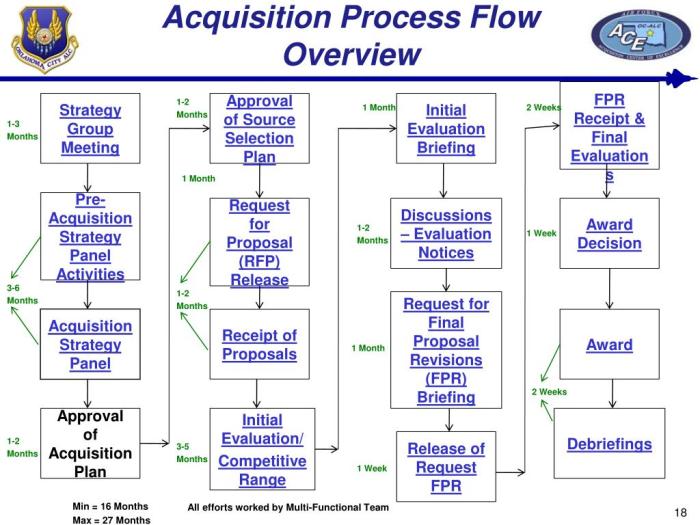
The implementation of the DoD Source Selection Procedures 2022 has yielded positive outcomes and valuable lessons learned. Several case studies and examples showcase the successful application of these procedures, highlighting best practices and demonstrating their impact on source selection processes.
One notable case study involves a major defense procurement project where the DoD employed a two-phase source selection approach. In the first phase, multiple vendors submitted proposals outlining their technical capabilities and cost estimates. The DoD evaluated these proposals and shortlisted a group of qualified vendors for the second phase.
Best Practices and Lessons Learned
The two-phase approach allowed the DoD to efficiently screen vendors and focus resources on the most promising candidates. It also enabled the DoD to conduct more in-depth evaluations and negotiations with the shortlisted vendors.
Another case study illustrates the benefits of using a risk-based approach in source selection. In this case, the DoD assigned risk levels to different aspects of the project, such as technical complexity and schedule constraints. Vendors were required to submit mitigation plans for high-risk areas, which were evaluated as part of the selection process.
Outcomes and Impact
The risk-based approach helped the DoD identify and mitigate potential risks early on, reducing the likelihood of project delays or cost overruns. It also fostered a collaborative environment where vendors worked with the DoD to develop realistic and achievable solutions.
These case studies demonstrate the effectiveness of the DoD Source Selection Procedures 2022 in streamlining and improving source selection processes. By incorporating best practices and lessons learned, the DoD can make informed decisions, reduce risks, and achieve optimal outcomes in defense procurement.
Comparison of DoD Source Selection Procedures 2022 with Industry Best Practices
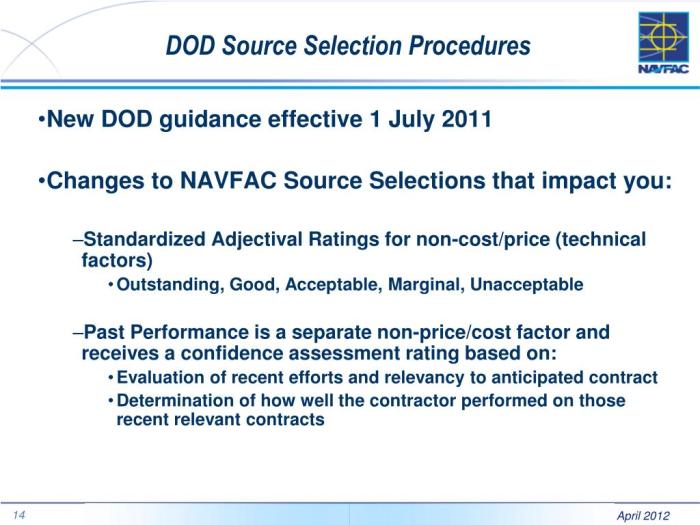
The Department of Defense (DoD) Source Selection Procedures 2022 align with industry best practices in several key areas. Both approaches emphasize the importance of:
- Objectivity and fairness in the evaluation process
- Transparency and communication with offerors
- Consideration of both cost and non-cost factors
Areas of Divergence
However, there are also some areas of divergence between the DoD procedures and industry best practices. One notable difference is the DoD’s emphasis on past performance as a key evaluation factor. While industry best practices generally recommend considering past performance, they typically do not give it as much weight as the DoD procedures do.
Another area of divergence is the DoD’s use of a “best value” approach, which allows for trade-offs between cost and non-cost factors. Industry best practices, on the other hand, typically recommend using a “lowest price technically acceptable” approach, which gives more weight to cost.
Implications for DoD Contracting Activities, Dod source selection procedures 2022
The differences between the DoD Source Selection Procedures 2022 and industry best practices have several implications for DoD contracting activities. First, contracting officers must be aware of these differences and take them into account when developing and implementing source selection plans.
Second, contracting officers must be prepared to explain and defend their decisions to offerors, particularly in cases where the DoD procedures differ from industry best practices.
Finally, contracting officers should consider seeking input from industry experts when developing and implementing source selection plans, particularly in areas where the DoD procedures differ from industry best practices.
Future Trends and Outlook for DoD Source Selection Procedures
The DoD source selection process is constantly evolving to meet the changing needs of the Department of Defense. In recent years, there have been a number of significant changes to the process, and it is likely that these changes will continue in the future.One
of the most significant trends in DoD source selection is the increasing use of data analytics. Data analytics can be used to improve the efficiency and effectiveness of the source selection process, and it is likely that this trend will continue in the future.Another
trend in DoD source selection is the increasing use of artificial intelligence (AI). AI can be used to automate tasks and improve decision-making, and it is likely that this trend will continue in the future.In addition to these trends, there are a number of other areas where further improvements or enhancements may be necessary.
These areas include:
- The development of more streamlined and efficient source selection procedures
- The use of more innovative and effective evaluation criteria
- The improvement of communication between the government and industry
By continuing to adapt to the evolving landscape of source selection, the DoD can ensure that it is getting the best possible value for its money.
Areas for Improvement
There are a number of areas where further improvements or enhancements to DoD source selection procedures may be necessary. These areas include:
- *Streamlining the source selection process. The source selection process can be lengthy and complex, and it is important to find ways to streamline the process without sacrificing quality.
- *Using more innovative and effective evaluation criteria. The evaluation criteria used in source selection should be designed to identify the best possible solution for the government’s needs.
- *Improving communication between the government and industry. Clear and open communication is essential for a successful source selection process.
By addressing these areas, the DoD can improve the efficiency and effectiveness of its source selection procedures.
FAQ Summary
What are the key changes introduced in the DoD Source Selection Procedures 2022?
The 2022 update includes significant changes such as a streamlined evaluation process, enhanced transparency measures, and a focus on risk management.
How do the DoD Source Selection Procedures 2022 impact stakeholders?
These procedures redefine roles and responsibilities, emphasizing collaboration and communication among stakeholders throughout the source selection process.
What are the best practices for implementing the DoD Source Selection Procedures 2022 effectively?
Best practices include establishing clear evaluation criteria, fostering open communication, and leveraging technology to enhance efficiency.